WordPress Dominates the CMS Market Currently with a 23% Market Share. But Why Aren’t Other Companies Catching Up?
Content Management Systems (CMS) facilitate businesses of all sizes, globally, to host their content over the internet. CMS facilitate business content creators to easily upload and manage enterprise information. This saves a lot of time and effort as individuals responsible for enterprise content do not have to build systems from scratch for content management.
Every business today wants a footprint over the internet. Business trends have shifted to lightning speeds with most businesses today showing far more enthusiasm to sell online. And a CMS helps brands do exactly that. Considering these factors, there is going to be a tremendous surge in the revenue potential for CMS globally. Analysts are positive that the CMS industry will be worth 16.221 billion dollars by 2021.
MarTech Series is doing a four-part series for a 360-degree view on this industry. The series will encapsulate information for buyers as well as sellers.
Part one intends to grasp the attention of CMS stakeholders to specifically look at the adoption of CMS in diverse industries, globally. The below mentioned simple representation of numbers is a jaw-dropping account of how unexplored CMS markets are worldwide.
Also Read: Phrasee Declares War on Spreading Negativity Through Advertising
CMS Market Share
Only 1/3rd of companies use CMS globally. The numbers mentioned below represent worldwide statistics that show details of the top 16 CMS and how they fair, market-share wise, by industry:
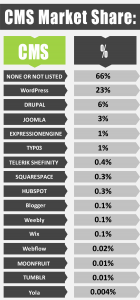
Further, the numbers are filtered to show the adoption of CMS in a variety of industries.
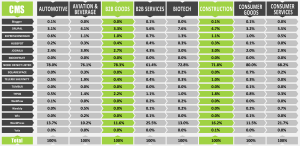
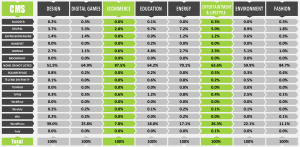
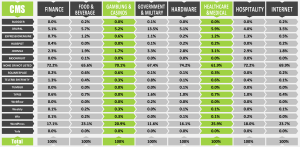
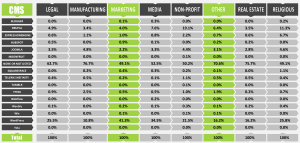
WordPress, Joomla and Drupal are the big three CMS platforms, that together occupy the maximum global market share. Nowadays, CMS such as SquareSpace, HubSpot and Wix are grabbing a lot of eyeballs due to their aptitude of dynamic innovations and marketing campaigns.
Calculated numbers are suggestive that the following five industries leverage CMS the most:
- B2B Services
- Internet
- Media
- Marketing
- Software
These numbers are, however, set to grow as and when the globe moves to mobile CMS. Also, one of the biggest factors in low adoption rates is the fact that companies continue to build their own systems, even after CMS offer excellent solutions, inexpensively.

MarTech Series wanted hands-on information about industries that can further leverage CMS. James Norwood, Executive Vice President Strategy and Chief Marketing Officer at Episerver, spoke exclusively to us to share his thoughts on the subject.
“As consumer habits have changed over the last few years it has become critical for organizations of any type and size to be able to communicate to their customers and prospective customers in a fast and effective way. In fact, many of our customers recognize that to offer a cohesive and relevant customer experience they need to more than just ‘manage’ content; they need to be able to personalize the experience for the user across all channels and respond to how the user wants to interact with them as an organization in new ways,” James said.
“Once the responsibility of the IT team only, companies in all sectors seem to recognize that the digital touchpoints they offer need to be closely aligned with customer requirements and the need to support the overall business strategy. Marketing is generally the department that this responsibility has shifted to over recent years. When content, commerce, and marketing are working on one screen, everyone from customer service to logistics has complete visibility into customers, business lines and more,” he said.
Also Read: Business Buying to Get Better as G2 Crowd Receives a Fresh Influx of $55 Million
Commenting on what Episerver’s clients love the most about it, he stated, “Customers continually tell us how much more they can get done with Episerver, whether that’s because of the intuitive on-page editing capability, the ability to easily collaborate with colleagues on projects or the fact that users have access to all the tools they need to orchestrate rich and engaging campaigns across multiple channels.”
There are roughly around 2 billion websites in the world — while half the world does not connect to the internet. The connected world is a vast market with infinite possibilities. This is just the new gold rush for global marketers. They need to act fast and develop CMS that are flexible, adaptive and can scale. So how do emerging CMS enterprises strategize their Sales & Marketing strategy? The marketing community needs to study the industries that have the maximum scope for CMS adoption. Sales teams need to know that this domain is bound to grow.

Venturing further to engage more thought leaders in the discussion, MarTech Series spoke to Stefan Schinkel, Chief Sales Officer, dotCMS.
Speaking about the type of industries that can benefit from CMS, he said, “Content Management is a horizontal play. Any organization, regardless of the industry, has a digital presence to engage with their audiences and deliver a customer experience. In my opinion, content is foundational to drive customer experiences and is the fuel for building an emotional bond between a brand and its customers or constituents.”
Also Read: Salesforce Reveals Pardot’s New Features for Winter ’19
“The most notable shift in Content Management, I think, has been the demarcation between business and IT. With modern CMS solutions, business teams are much more self-sufficient and independent of IT than let’s say 10-15 years ago. This trend will continue but if I can call out one technology that is making its way into the CMS, it will be Artificial Intelligence. Creation of content is still manual labor and if you have or need a lot of content, smart algorithms can help. Already in dotCMS, we have an integration with Amazon Rekognition to help tag images and binaries at scale. In order to hyper-personalize digital experiences, marketers are now limited by rule-based content targeting engines. These rules are set manually. There is room for machine co-workers to do this automatically at scale, I’d say. Lastly, predictive analytics will make its way to CMS as well. With the multitude of apps, websites, channels, and other digital marketing tools, it’s becoming increasingly hard for marketers to get actionable insights from their digital experience platform. Predictive analytics can help streamline insights in data patterns and identify intent.”
Stefan said what clients about dotCMS like about the product is, “dotCMS is an enterprise-grade and feature-rich CMS. dotCMS stands out compared to the rest of the industry; It is high level NoCode. The centerpiece of the authoring environment (‘Edit Mode’) allows marketers to make (and change) templates, content types, page layouts, and complex multi-step content approval and publishing workflows. Not a single line of coding is required, so development teams can focus on innovation.”
Also Read: Resonate Releases ‘State of the Consumer’ Report
Key Takeaways for Marketers
This information is an excellent starting point for Enterprises and Marketers to design niche Content Management Systems that service and resolve industry-specific needs and problems respectively. The entire world is a potential market for CMS. Brands can leverage an army of Marketing Automation tools to target prospective customers and generate business.
Our featured CMS speakers have delivered useful insights on myriad aspects of Content Management Systems. Depending on enterprise inclinations and preferences, brands can churn out products that truly help others businesses propel in the right direction for Content Management. This initiative also substantially bolsters brand value, because CMS are authentic products, which are very useful for a brand to have a continuous presence on the internet.
In the next part, we discuss the types of Content Management Systems, touching on CMS’ paradigm globally. The second part is useful for business strategy, more importantly, product development so that CMS developers get a headstart in their business endeavor.
We wanted to end part one by exclusively speaking to another CMS enterprise to get insights on industries that can adopt CMS. This is what Ben Haynes, Co-founder, Directus, had to say.

“What we’ve realized from working with our various clients is that every industry that utilizes managed data (almost all of them) can take advantage of a proper headless CMS: Internet of Things, Digital Billboards, Medical Records, Digital Asset Management, Product Inventory, Data Analytics, and more. And even if the industry doesn’t explicitly manage data, they can use a “private” headless CMS for business intelligence, company directory, or asset management. The use cases of a modern headless CMS are as ubiquitous as spreadsheets.”
Recommended Read: Snapchat Releases Retail Footprints






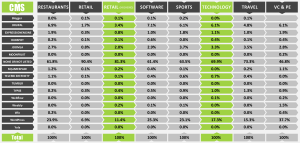






Comments are closed.